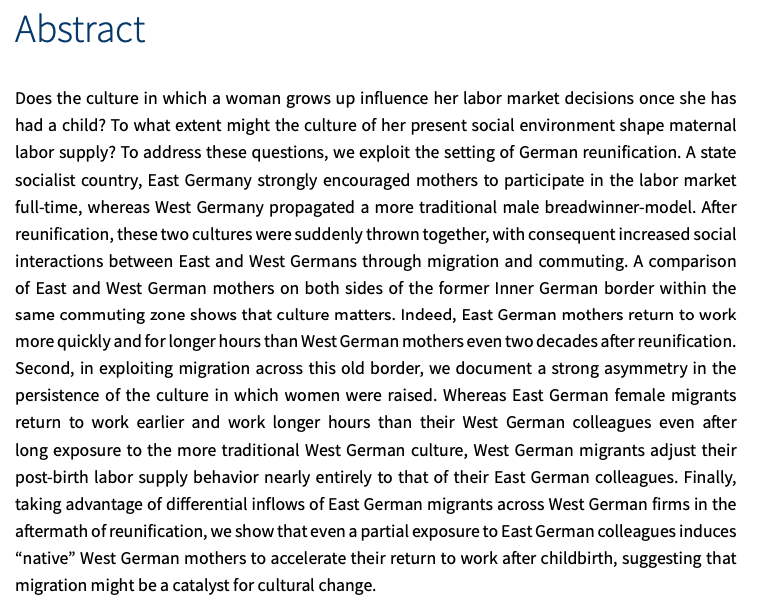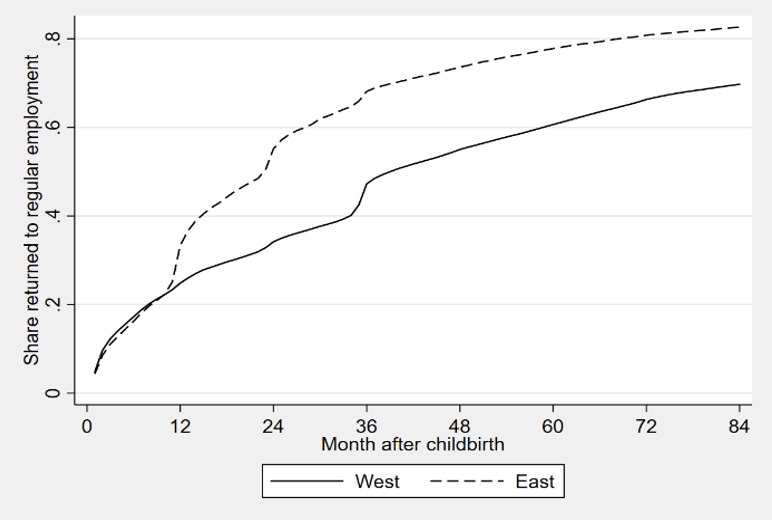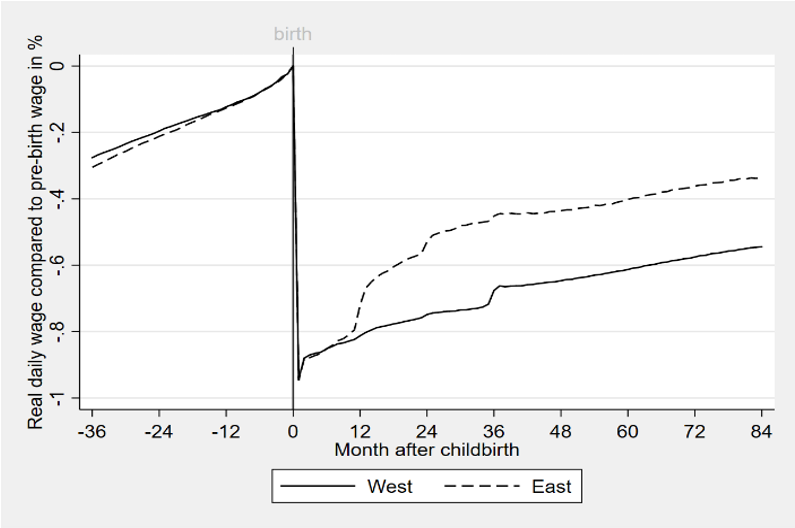New WP: Wind of Change? Cultural Determinants of Maternal Labor Supply
Anna Raute @qmuleconomics, Uta Schönberg @EconUCL @CReAM_Research and I study the effect of childhood culture and present social environment on the return-to-work decision of mothers. https://abs.twimg.com/emoji/v2/... draggable="false" alt="🧵" title="Thread" aria-label="Emoji: Thread">
https://abs.twimg.com/emoji/v2/... draggable="false" alt="🧵" title="Thread" aria-label="Emoji: Thread"> https://abs.twimg.com/emoji/v2/... draggable="false" alt="👇" title="Rückhand Zeigefinger nach unten" aria-label="Emoji: Rückhand Zeigefinger nach unten"> 1/n #EconTwitter
https://abs.twimg.com/emoji/v2/... draggable="false" alt="👇" title="Rückhand Zeigefinger nach unten" aria-label="Emoji: Rückhand Zeigefinger nach unten"> 1/n #EconTwitter
Anna Raute @qmuleconomics, Uta Schönberg @EconUCL @CReAM_Research and I study the effect of childhood culture and present social environment on the return-to-work decision of mothers.
2/ We find that a gender egalitarian culture in which a mother grew up is stickier than a traditional one; that there is scope for cultural transmission as adults which is stronger moving from traditional to egalitarian; and that migration can be a driver of cultural change.
3/ We exploit the setting of the German reunification. As a state socialist country, East Germany strongly encouraged mothers to participate in the labor market full-time, whereas West Germany propagated a more traditional male breadwinner-model.
4/ Decades after reunification, East Germans still return to work after a year, according to the institutional incentives in the former GDR. West Germans, on the other hand, often only return after 3 years when current job protection ends.
5/ This translates into substantial differences in earnings losses due to motherhood between East and West. These findings relate to the research on childhood penalties and gender norms by Henrik Kleven, @landais_camille, @JohannaPosch, Andreas Steinhauer, Josef Zweimüller.
6/ Culture matters for these differences: Comparing East and West Germans on either side of the border within the same commuting zone, we show that East Germans return more quickly, work more hours and are more likely to continue their prebirth careers.
7/ Looking at cross-border migrants, we show that a gender egalitarian childhood culture is stickier than a traditional one. Whereas East G migrants hardly change their labour supply, even after long immersion, West G migrants behave almost the same as their colleagues from East.
8/ What drives this adjustment of West Germans? We show that West German return migrants return more quickly to work than West German stayers who take maternity leave in the same firm and year. One possibility is that exposure to the East German culture triggered learning.
9/ Does cultural transmission require full immersion though? In a DiD, West German mothers in firms with large inflows of East Germans after reunification return more quickly than mothers in firms w/o East Germans, indicating that migration can be a catalyst for cultural change.
10/ The East German socialist regime has left an important legacy. Yet, social interactions between East and West were too limited to bring about major cultural change in the West. Extrapolating between 1994 and 2007, convergence would take 132 years more, or 4-5 generations.
11/11 Here’s the link for all the detail. Thanks to @iab_news and in particular @MalteSandner for great support with the data!  https://abs.twimg.com/emoji/v2/... draggable="false" alt="🤩" title="Vom Star geblendet" aria-label="Emoji: Vom Star geblendet">
https://abs.twimg.com/emoji/v2/... draggable="false" alt="🤩" title="Vom Star geblendet" aria-label="Emoji: Vom Star geblendet">
Link: http://doku.iab.de/discussionpapers/2020/dp3020.pdf">https://doku.iab.de/discussio...
Link: http://doku.iab.de/discussionpapers/2020/dp3020.pdf">https://doku.iab.de/discussio...

 Read on Twitter
Read on Twitter https://abs.twimg.com/emoji/v2/... draggable="false" alt="👇" title="Rückhand Zeigefinger nach unten" aria-label="Emoji: Rückhand Zeigefinger nach unten"> 1/n #EconTwitter" title="New WP: Wind of Change? Cultural Determinants of Maternal Labor SupplyAnna Raute @qmuleconomics, Uta Schönberg @EconUCL @CReAM_Research and I study the effect of childhood culture and present social environment on the return-to-work decision of mothers. https://abs.twimg.com/emoji/v2/... draggable="false" alt="🧵" title="Thread" aria-label="Emoji: Thread">https://abs.twimg.com/emoji/v2/... draggable="false" alt="👇" title="Rückhand Zeigefinger nach unten" aria-label="Emoji: Rückhand Zeigefinger nach unten"> 1/n #EconTwitter" class="img-responsive" style="max-width:100%;"/>
https://abs.twimg.com/emoji/v2/... draggable="false" alt="👇" title="Rückhand Zeigefinger nach unten" aria-label="Emoji: Rückhand Zeigefinger nach unten"> 1/n #EconTwitter" title="New WP: Wind of Change? Cultural Determinants of Maternal Labor SupplyAnna Raute @qmuleconomics, Uta Schönberg @EconUCL @CReAM_Research and I study the effect of childhood culture and present social environment on the return-to-work decision of mothers. https://abs.twimg.com/emoji/v2/... draggable="false" alt="🧵" title="Thread" aria-label="Emoji: Thread">https://abs.twimg.com/emoji/v2/... draggable="false" alt="👇" title="Rückhand Zeigefinger nach unten" aria-label="Emoji: Rückhand Zeigefinger nach unten"> 1/n #EconTwitter" class="img-responsive" style="max-width:100%;"/>




